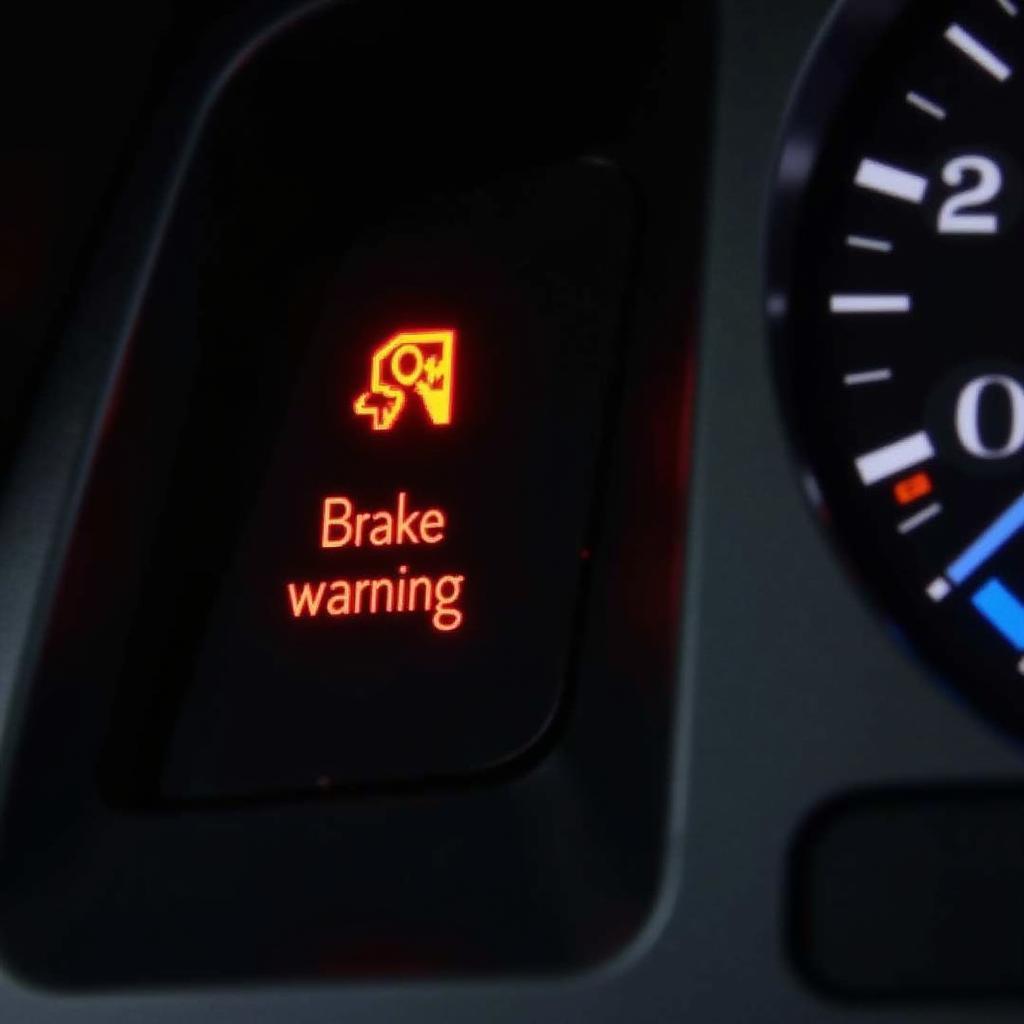Hearing a brake warning sound from your 2013 F150 can be unnerving. As a specialist in automotive electrical engineering with expertise in remote diagnostics, programming, and software installation, I’m here to help you diagnose and potentially fix the issue.
 2013 Ford F150 brake warning light illuminated on the dashboard
2013 Ford F150 brake warning light illuminated on the dashboard
Common Causes of Brake Warning Sounds
Several factors can trigger a brake warning sound in your 2013 F150. Here’s a breakdown of the most common culprits:
1. Worn Brake Pads
Brake pads are designed to wear down over time. When they reach a certain thickness, a small metal indicator tab contacts the brake rotor, creating a high-pitched squealing or scraping sound.
Expert Insight: “Ignoring worn brake pads can lead to costly rotor damage. At the first sign of a brake warning sound, get your pads inspected,” says John Miller, a seasoned automotive technician.
2. Low Brake Fluid Level
Your F150’s brake system relies on hydraulic pressure to function properly. If the brake fluid level drops too low, it can trigger a warning light and potentially a sound.
3. Faulty ABS System
The Anti-lock Braking System (ABS) prevents your wheels from locking up during hard braking. A malfunctioning ABS module or sensor can activate the warning system, sometimes accompanied by a grinding noise.
4. Parking Brake Engaged
Sometimes, the simplest explanation is the most likely. If you hear a continuous chime or beep, make sure your parking brake isn’t partially engaged.
Troubleshooting the Warning Sound
Before assuming the worst, try these troubleshooting steps:
- Check Your Parking Brake: Ensure the parking brake is fully disengaged.
- Inspect Brake Fluid Level: If you’re comfortable doing so, carefully check the brake fluid level in the master cylinder reservoir. If it’s low, add the appropriate brake fluid (DOT 3 is common for F150s).
- Listen Carefully: Pay close attention to the type of sound and when it occurs. Is it a squeal, grind, or chime? Does it happen when you press the brake pedal, or is it constant?
When to Seek Professional Help
If the warning sound persists or you suspect a more serious issue, it’s crucial to seek professional help. A qualified mechanic can:
- Diagnose the Problem: They have the tools and expertise to pinpoint the exact cause of the warning sound.
- Inspect Brake Components: They can check the condition of your brake pads, rotors, calipers, and other brake system parts.
- Test the ABS System: They can use diagnostic equipment to identify any issues with the ABS module, sensors, or wiring.
Expert Insight: “Don’t delay brake repairs. Addressing brake issues promptly ensures your safety and prevents more extensive damage,” advises Sarah Thompson, an ASE-certified master technician.
Remote Diagnostics and Programming Options
In certain situations, remote diagnostics and programming can be utilized to diagnose and even resolve brake-related issues, especially those related to the electronic components of the braking system. This involves connecting your F150 to a specialized computer system that allows technicians to access and analyze vehicle data remotely.
For instance, if a faulty ABS sensor is detected, it might be possible to reprogram the ABS module remotely to address the issue. However, it’s essential to note that the feasibility of remote solutions depends on the specific nature of the problem and the capabilities of your vehicle’s systems.
Preventative Maintenance is Key
Regular brake system maintenance is crucial for optimal performance and safety. Schedule the following services as recommended in your F150’s owner’s manual:
- Brake Inspections: Have your brakes inspected annually or more frequently if you drive in harsh conditions.
- Brake Fluid Flush: Brake fluid absorbs moisture over time, which can reduce its effectiveness. Aim to have it flushed every 2-3 years.
By taking a proactive approach to brake maintenance and addressing any warning signs promptly, you can ensure your 2013 F150’s braking system remains in top condition, providing you with peace of mind on the road.
FAQs
Q: Can I drive my F150 with a brake warning sound?
A: It’s not recommended. A brake warning sound indicates a potential problem. Driving with compromised brakes can be dangerous.
Q: How much does it cost to fix a brake warning sound?
A: The cost depends on the underlying cause. Simple fixes, like brake pad replacement, are less expensive than complex repairs, like ABS module replacement.
Q: How often should I replace my brake pads?
A: Brake pad lifespan varies greatly depending on driving habits and conditions. However, it’s generally recommended to have them inspected at least once a year.
Q: Can I check my brake fluid level myself?
A: Yes, but exercise caution. The brake fluid reservoir is typically located near the firewall on the driver’s side. Consult your owner’s manual to locate it and add fluid if needed.
Q: Can a low tire pressure trigger a brake warning sound?
A: While low tire pressure can illuminate a TPMS (Tire Pressure Monitoring System) warning light, it typically doesn’t cause a brake warning sound.
Q: Can I use remote diagnostics to fix my 2013 F150 brake warning sound?
A: The effectiveness of remote diagnostics depends on the specific issue. In some cases, it might be possible to diagnose and even resolve the problem remotely.
Q: How do I know if my 2013 F150 needs new brake rotors?
A: Signs of worn brake rotors include vibration in the steering wheel when braking, a grinding noise, and visible grooves or scoring on the rotor surface.
Remember, your safety is paramount. If you encounter a brake warning sound or any other brake-related issue with your 2013 F150, don’t hesitate to seek professional assistance.
